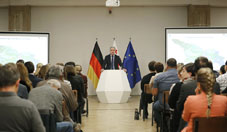
Results of the first National Forest Inventory of Georgia presented thanks to German support
Friday, November 4, 2022
In 2013, Georgia initiated the reform of the forest sector by involving stakeholders from the government and private sector, as well as from academia and the civil society. Under the umbrella of the so-called National Forest Programme, the National Forest Concept and the new Forest Code were developed, along with criteria and indicators for sustainable forest management. However, one great uncertainty remained for a long time - what is the actual state of Georgia's forests?
To find clear answers, the German Government funded the design, the preparation, and the implementation of Georgia's first statistically sound National Forest Inventory (NFI), technically supported by the Deutsche Gesellschaft für Internationale Zusammenarbeit (GIZ) GmbH.
80 forest variables were assessed at more than 2,000 field clusters between 2019 and 2021 by specifically trained Georgian field teams. After months of deep analysis, the results were presented by the Ministry of Environmental Protection and Agriculture at an international hybrid conference, held in Tbilisi on 3rd and 4th of November 2022.
The results show that 44.7% of Georgia are covered by forests. With more than 130 tree and bush species recorded, Georgia's forests are still rather natural in terms of diversity, offering good habitat for many animal and plant species. Besides being ecologically valuable, diverse forests also offer good resilience against the impacts of climate change. On the other hand, more than one third of the forests are degraded due to unsustainable management, pests, disease, and grazing by cattle and sheep. The situation is highly dramatic for the Box tree with more than ninety percent having died.
Based on the results of the NFI, Germany primarily through GIZ and KfW will continue to support its Georgian partners in the further roll-out of the forest sector reform.
The forest sector reform is primarily implemented through the ECO.Georgia project (2021-2028) co-funded by the Government of Georgia, the Green Climate Fund, the German Government, and the Swiss Agency for Cooperation and Development (SDC).



